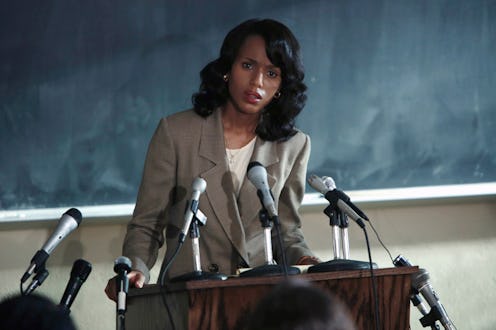Entertainment
Did People Believe Anita Hill?

In July 1991, President George H.W. Bush nominated Clarence Thomas to replace Justice Thurgood Marshall on the United States Supreme Court. During the nomination hearings, Oklahoma law professor Anita Hill — who worked under Thomas 10 years prior — accused him of sexual harassment, an accusation that Thomas denied. An HBO docudrama that premieres April 16 outlines the Hill v. Thomas controversy that shook the nation in the early '90s, with Kerry Washington playing Hill and Wendell Pierce as Thomas. Even now, neither Thomas nor Hill's version of events has been verified. But whose side did the general public fall on during the time? Did people believe Anita Hill?
When the Senate Judiciary Committee appointed the FBI to investigate Hill's allegations, the FBI report came back inconclusive. Generally speaking, the case was a matter of “he said, she said.” As Thomas vehemently denied the accusations, the public seemed to be on board with his testimony. Thomas stated in his testimony that Hill's allegations played "into racist, bigoted stereotypes." He even described the hearings as a "high-tech lynching." (In Sept. 2011, Hill spoke to the New York Times about Thomas' "high-tech lynching" comment, saying "none of those historical lynchings that he is referring to involved a lynching on behalf of a black woman’s accusation ... it was as though my own race really didn’t matter.")
And his defense resonated. A New York Times /CBS News telephone poll taken in October of 1991 showed that 58 percent of the 501 adult respondents believed Thomas, whereas only 24 percent believed Hill.
When Hill's accusations of Thomas's alleged sexual misconduct were made public, a national conversation on sexual harassment began. In American history, the Hill v. Thomas case was a splitting — and metamorphic — moment. The smaller percentage of people who stood behind Hill showed their support in the form of T-shirts and buttons that read "I believe Anita Hill."
Angela Wright — a North Carolina journalist who was never called to testify — had was a former employee of Thomas' and allegedly, in her words, "had evidence to support Anita Hill." In 1994, Florence George Graves of Washington Post wrote an article that spotlighted Wright, her work with Thomas, and her involvement with the hearings. In the article — titled “The Other Woman" — Graves claimed that Wright had allegedly witnessed Thomas conduct himself in an inappropriate matter in the workplace and that her statements regarding Thomas could have exponentially affected the case. (Thomas did not respond to Graves' request for an interview, according to her Washington Post article, and maintained his silence on the matter of sexual harassment allegations.)
Also, before Hill ever even testified, then-House Representative Barbara Boxer and six other representatives famously implored the Senate Judiciary Committee to take Hill's accusations seriously and to investigate her claims before voting on Thomas.
Ultimately though, claims of sexual harassment were a rather new topic to the majority of the public. And as HBO's trailer for Confirmation retells in rather dramatic overtones, some people saw Thomas as the victim throughout the hearings. Washington told The New York Times, "Anita was somebody that was on the outside, somebody who didn’t have the power and somebody who was up against the powers that be.”
And when you make claims against the powers that be, finding people to believe your side of the story is never going to be an easy task.
Images: Frank Masi/HBO (3)